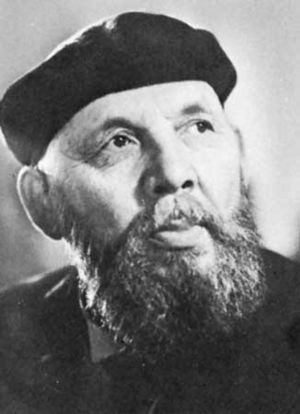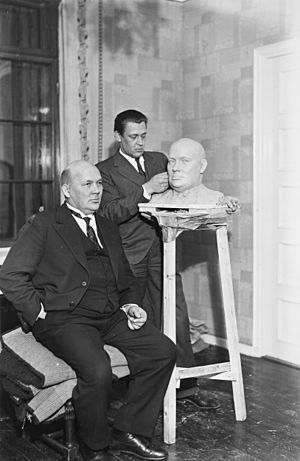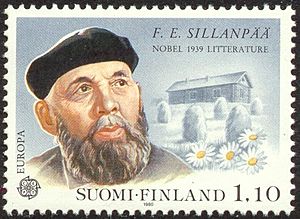Frans Eemil Sillanpää facts for kids
Quick facts for kids
Frans Eemil Sillanpää
|
|
|---|---|
 |
|
| Born | 16 September 1888 Hämeenkyrö, Finland |
| Died | 3 June 1964 (aged 75) Helsinki, Finland |
| Occupation | Writer |
| Nationality | Finnish |
| Notable works | The Maid Silja |
| Notable awards | Nobel Prize in Literature |
Frans Eemil Sillanpää (born September 16, 1888 – died June 3, 1964) was a very famous Finnish writer. In 1939, he became the first Finnish writer to win the Nobel Prize in Literature. He received this award for his amazing ability to show the lives of farmers in his country. He also beautifully described their connection with nature. One of his most well-known novels is The Maid Silja from 1931.
Contents
Frans Sillanpää's Early Life
Frans Eemil Sillanpää was born into a poor farming family in Hämeenkyrö, Finland. Even though his parents didn't have much money, they made sure he could go to school. He went to school in Tampere.
Frans was a very good student. With help from a kind person named Henrik Liljeroos, he went to the University of Helsinki in 1908. He started studying medicine there. At the university, he met many important people. These included famous painters like Eero Järnefelt and Pekka Halonen. He also met the composer Jean Sibelius and the author Juhani Aho.
Frans Sillanpää's Writing Career
After five years, in 1913, Sillanpää left Helsinki. He moved back to his old home village. There, he decided to focus completely on writing. In 1914, he started writing articles for a newspaper called Uusi Suometar. In 1916, he married Sigrid Maria Salomäki, whom he had met two years earlier.
Sillanpää was against all kinds of fighting and violence. He believed that science could make the world better. In his books, he often showed how people in the countryside lived very closely with nature and the land.
His novel Hurskas kurjuus (which means Meek Heritage) came out in 1919. This book talked about the reasons behind the Finnish Civil War. Even though he tried to be fair and balanced, the book caused some disagreements at the time.
Sillanpää became famous around the world for his novel Nuorena nukkunut. This book was translated into English as The Maid Silja in 1931.
In 1939, he received the Nobel Prize in Literature. The award recognized his deep understanding of Finnish farmers. It also praised his beautiful way of showing their lives and their connection to nature. Just a few days after he got the prize, a war started. This was the Winter War between Finland and the Soviet Union. Sillanpää showed his patriotism by donating his golden Nobel medal. He had it melted down to help raise money for the war effort.
Before the Winter War, Sillanpää wrote the words for a song. It is known as Sillanpään marssilaulu (Sillanpää's Marching Song). He wrote it to cheer himself up. His oldest son, Esko, was doing military training at the Karelian Isthmus at the time.
In 1939, his wife Sigrid passed away from pneumonia. She left eight children for Sillanpää to care for. Later, he married his secretary, Anna von Hertzen. They traveled to Stockholm together for him to receive his Nobel Prize.
In 1941, Sillanpää and Anna divorced. His health got worse, and he needed to go to the hospital. By 1943, he was well enough to return to public life. He became known as a wise, bearded old man, "Grandpa Sillanpää." His radio talks became very popular. He especially became famous for his tradition of speaking on Christmas Eve. He did this every year from 1945 to 1963.
An asteroid was named after him! The asteroid 1446 Sillanpää was found on January 26, 1938. It was discovered by a famous Finnish astronomer named Yrjö Väisälä.
Frans Sillanpää's Death
Frans Sillanpää died on June 3, 1964, in Helsinki. He was 75 years old.
Frans Sillanpää's Books
Here are some of the books Frans Sillanpää wrote:
- Elämä ja aurinko (1916)
- Ihmislapsia elämän saatossa (1917)
- Hurskas kurjuus (translated as Meek Heritage) (1919)
- Rakas isänmaani (1919)
- Hiltu ja Ragnar (1923)
- Enkelten suojatit (1923)
- Omistani ja omilleni (1924)
- Maan tasalta (1924)
- Töllinmäki (1925)
- Rippi (1928)
- Kiitos hetkistä, Herra... (1930)
- Nuorena nukkunut (translated as The Maid Silja) (1931)
- Miehen tie (1932)
- Virranpohjalta (1933)
- Ihmiset suviyössä (translated as People in the Summer Night) (1934)
- Viidestoista (1936)
- Elokuu (1941)
- Ihmiselon ihanuus ja kurjuus (1945)
Films Based on Sillanpää's Works
Many of Frans Sillanpää's books have been made into movies:
- Nuorena nukkunut, directed by Teuvo Tulio. 1937
- One Man's Faith, directed by Nyrki Tapiovaara and Hugo Hytönen. 1940
- Ihmiset suviyössä, directed by Valentin Vaala. 1948
- Poika eli kesäänsä, directed by Roland af Hällström. 1955 (This film was based on his novel Elämä ja aurinko)
- The Harvest Month, directed by Matti Kassila. 1956
- Silja – nuorena nukkunut, directed by Jack Witikka. 1956
- The Glory and Misery of Human Life, directed by Matti Kassila. 1988
See also
 In Spanish: Frans Eemil Sillanpää para niños
In Spanish: Frans Eemil Sillanpää para niños
 | Emma Amos |
 | Edward Mitchell Bannister |
 | Larry D. Alexander |
 | Ernie Barnes |



